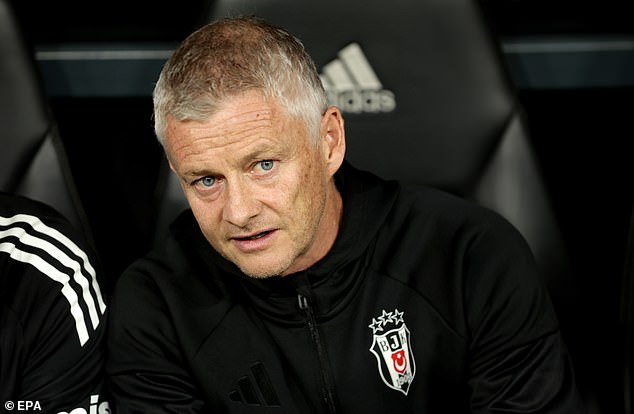In a move that sent shockwaves through the footballing world, Besiktas, one of Turkey’s most storied football clubs, announced the termination of their contract with manager Ole Gunnar Solskjaer. The decision, confirmed in a curt 39-word statement following a board meeting, came just hours after the club’s elimination from the UEFA Conference League play-offs at the hands of Lausanne-Sport, a Swiss club owned by Ineos. Solskjaer, the former Manchester United legend who had been appointed in January 2025, was relieved of his duties after only eight months in charge, marking a dramatic and abrupt end to his first managerial role since his departure from Old Trafford in November 2021.
The news, while sudden, was not entirely unexpected given the high expectations and intense scrutiny that come with managing a club of Besiktas’ stature. The Turkish giants, known for their passionate fanbase and rich history, had hoped Solskjaer’s appointment would usher in a new era of success, both domestically and in European competitions. However, a 2-1 aggregate defeat to Lausanne-Sport, culminating in a 1-0 loss at home, proved to be the final straw for a board and fanbase already frustrated by the team’s inconsistent performances. This article delves into the circumstances surrounding Solskjaer’s sacking, his tenure at Besiktas, the broader context of Turkish football, and what this means for the Norwegian’s managerial career moving forward.
The Rise and Fall of Solskjaer at Besiktas
Ole Gunnar Solskjaer’s appointment as Besiktas manager in January 2025 was met with a mixture of intrigue and optimism. The 52-year-old Norwegian, revered for his playing career at Manchester United, where he scored the iconic winning goal in the 1999 Champions League final, had been out of management since his high-profile exit from Old Trafford. His time at United was a rollercoaster, marked by moments of brilliance—such as a second-place finish in the Premier League and a Europa League final appearance—interspersed with periods of inconsistency that ultimately led to his dismissal. When Besiktas came calling, it was seen as an opportunity for Solskjaer to rebuild his managerial reputation in a new environment, far from the relentless scrutiny of the English Premier League.
Besiktas, one of Turkey’s “Big Three” clubs alongside Galatasaray and Fenerbahce, has a proud history of domestic and European success. The club’s passionate supporters, known for creating one of the most intimidating atmospheres in European football at the Vodafone Park stadium, expected Solskjaer to deliver results commensurate with the club’s ambitions. The SuperLig, Turkey’s top flight, is a fiercely competitive league, and Besiktas had their sights set on reclaiming the title, which they last won in the 2020-21 season. Additionally, the club aimed to make a mark in European competitions, particularly the UEFA Conference League, which offered a realistic chance of silverware for clubs outside Europe’s elite.
Solskjaer’s arrival was heralded as a coup for Besiktas. His reputation as a player and his experience managing Manchester United, one of the world’s biggest clubs, brought a sense of prestige to the appointment. The Norwegian was tasked with implementing an attacking, high-pressing style of play, leveraging his experience in the Premier League to elevate Besiktas’ standing both domestically and in Europe. The club’s chairman, Serdal Adalı, expressed confidence in Solskjaer’s ability to lead the team to success, citing his track record of nurturing young talent and his understanding of the modern game.
However, the reality of managing in Turkey proved to be a formidable challenge. The SuperLig is known for its volatility, with managers often facing intense pressure to deliver immediate results. The passionate fanbase, while a source of strength, can also be unforgiving when expectations are not met. Solskjaer’s tenure began promisingly, with a series of pre-season friendlies showcasing an exciting brand of football. The team’s performances in the early months of 2025 were solid, if unspectacular, with Besiktas hovering in the upper echelons of the SuperLig table. However, cracks began to appear as the season progressed, particularly in European competitions.
The Conference League Debacle
The UEFA Conference League, introduced in 2021, has become a vital platform for clubs like Besiktas to compete on the European stage. While not as prestigious as the Champions League or Europa League, the competition offers a pathway to silverware and valuable UEFA coefficient points, which can enhance a club’s standing in future European draws. Besiktas entered the 2024-25 Conference League play-offs with high hopes, having navigated earlier qualifying rounds with relative ease. Their opponents in the play-off round, Lausanne-Sport, were seen as a manageable challenge, despite the Swiss club’s backing by Ineos, the multinational conglomerate that also owns Ligue 1 side Nice and has a stake in Manchester United.
The first leg of the tie, played in Switzerland, ended in a 1-1 draw, a result that left Besiktas in a strong position heading into the home leg at Vodafone Park. With the backing of their fervent supporters, the Turkish side were expected to secure a comfortable victory and advance to the Conference League group stage. However, the second leg proved to be a disaster. Lausanne-Sport, managed with tactical discipline, capitalized on Besiktas’ defensive frailties to secure a 1-0 victory, resulting in a 2-1 aggregate defeat. The loss was a bitter pill to swallow for Besiktas, who had invested heavily in their squad and coaching staff to compete in Europe.
The manner of the defeat was particularly galling. Besiktas struggled to break down Lausanne-Sport’s organized defense, and Solskjaer’s tactical decisions— including his choice to stick with a high-pressing system despite the opposition’s counter-attacking threat—came under heavy criticism. Fans and pundits alike pointed to a lack of adaptability in Solskjaer’s approach, a recurring critique from his time at Manchester United. The defeat marked Besiktas’ elimination from European competition for the 2024-25 season, a significant blow to the club’s ambitions and finances.
The Board’s Decision and Solskjaer’s Departure
The fallout from the Conference League exit was swift and decisive. Just hours after the final whistle, Besiktas’ board convened an emergency meeting to discuss Solskjaer’s future. The club’s statement, released shortly thereafter, was brief and to the point: “Our contract with manager Ole Gunnar Solskjaer has been terminated following a decision made at the board meeting. Following the meeting, our chairman, Serdal Adalı, thanked Solskjaer for his services to date. We respectfully present it to the public.” The 39-word announcement was a stark reflection of the club’s no-nonsense approach to managerial changes, a hallmark of Turkish football where patience is often in short supply.
The timing of the sacking was particularly striking, as it came just one match into the 2025-26 SuperLig season. While Besiktas’ domestic campaign had only just begun, the board’s decision to act so swiftly underscored the weight of the European disappointment. For a club with Besiktas’ ambitions, failing to qualify for the Conference League group stage was not just a sporting setback but a financial one, as European competitions provide significant revenue through prize money, broadcasting rights, and matchday income.
Solskjaer’s sacking also highlighted the precarious nature of managerial tenures in the SuperLig. The league is notorious for its high turnover of coaches, with even successful managers often lasting only a season or two. The pressure to deliver instant results, coupled with the intense scrutiny from fans and media, creates an environment where patience is a luxury few clubs can afford. Solskjaer, despite his pedigree and reputation, was not immune to these realities.
Solskjaer’s Tenure: A Closer Look
To fully understand the context of Solskjaer’s sacking, it’s worth examining his eight-month stint at Besiktas in greater detail. When he arrived in January 2025, Solskjaer inherited a squad with a mix of experienced internationals and promising young talents. Players like Cenk Tosun, a former Everton striker, and Salih Ucan, a versatile midfielder, formed the backbone of the team, while younger players such as Semih Kilicsoy, a highly rated forward, represented the club’s future. Solskjaer’s remit was to blend these elements into a cohesive unit capable of challenging for the SuperLig title and making a mark in Europe.
In his first few months, Solskjaer implemented a 4-2-3-1 formation, emphasizing attacking football and high pressing. The approach yielded mixed results. Besiktas secured several impressive victories, including a notable derby win against rivals Fenerbahce, which endeared Solskjaer to the fans. However, defensive vulnerabilities and a lack of consistency in big matches raised concerns. The team’s performances in the SuperLig were respectable, with Besiktas finishing the 2024-25 season in the top four, securing European qualification for the following campaign. Yet, the expectation was always for more, particularly in a league dominated by the fierce rivalry between Besiktas, Galatasaray, and Fenerbahce.
Solskjaer’s man-management skills, often praised during his time at Manchester United, were a key asset at Besiktas. Players spoke highly of his ability to foster a positive dressing-room atmosphere, and his work with young talents like Kilicsoy showed promise. However, his tactical acumen came under scrutiny, particularly in high-stakes matches. Critics argued that Solskjaer’s reliance on an attacking philosophy left the team exposed at the back, a flaw that Lausanne-Sport exploited in the Conference League play-offs. His substitutions and in-game adjustments were also questioned, with some fans and analysts pointing to a lack of a “Plan B” when the initial strategy faltered.
The Bigger Picture: Turkish Football and Managerial Pressure
Solskjaer’s sacking must be viewed within the broader context of Turkish football, where managerial tenures are notoriously short-lived. The SuperLig is a league driven by passion, with fans and media creating an intense pressure cooker for coaches. Clubs like Besiktas, Galatasaray, and Fenerbahce are expected to compete for the title every season, and failure to deliver can result in swift consequences. In recent years, even successful managers like Fatih Terim, a legend at Galatasaray, have faced criticism and sackings when results dipped.
The cultural and structural factors of Turkish football also play a role. Unlike the Premier League, where managers are often given time to build a project (albeit with exceptions), the SuperLig operates on a results-driven model. Club presidents and boards, sensitive to fan sentiment and financial pressures, are quick to make changes when expectations are not met. For Besiktas, the Conference League exit was not just a sporting failure but a blow to the club’s prestige and financial health, prompting the board to act decisively.
Moreover, the SuperLig’s competitive landscape has evolved in recent years. The influx of foreign investment, high-profile signings, and the growing influence of Saudi-backed clubs in the region have raised the stakes. Besiktas, like their rivals, have sought to attract high-profile managers and players to maintain their status, but this has also increased expectations. Solskjaer’s appointment was part of this trend, but his inability to deliver immediate success in Europe exposed him to the harsh realities of the Turkish football ecosystem.
Solskjaer’s Managerial Journey: From Old Trafford to Istanbul
Solskjaer’s sacking from Besiktas marks another chapter in a managerial career that has been both promising and polarizing. His time at Manchester United, where he served as caretaker manager before earning the permanent role, showcased his ability to galvanize a squad and restore confidence. Under his stewardship, United achieved memorable victories, including a stunning Champions League comeback against Paris Saint-Germain in 2019. However, his tenure was also marked by criticism over his tactical limitations and inability to win silverware, culminating in his dismissal after a string of poor results in 2021.
Following his exit from United, Solskjaer took a break from management, focusing on family and exploring punditry and consultancy roles. His decision to join Besiktas was seen as a bold move, signaling his desire to prove himself in a different footballing culture. The move to Turkey offered a fresh start, free from the intense media scrutiny of England, but it also came with its own challenges. The SuperLig’s unique blend of passion, pressure, and unpredictability tested Solskjaer in ways he had not experienced before.
Comparisons between his time at United and Besiktas reveal both similarities and differences. At United, Solskjaer was criticized for his reactive approach in big games, a trait that resurfaced in the Lausanne-Sport defeat. However, his ability to connect with players and foster a positive team culture was evident in both roles. The key difference lies in the expectations and timelines: while United allowed Solskjaer nearly three years to build his project, Besiktas’ swift decision to sack him after eight months reflects the cutthroat nature of Turkish football.
What’s Next for Solskjaer and Besiktas?
For Ole Gunnar Solskjaer, the sacking from Besiktas represents a setback but not the end of his managerial journey. At 52, he remains a relatively young coach with a wealth of experience and a reputation as a positive, player-focused manager. His next move will be crucial in shaping his legacy. A return to England, perhaps in the Championship or a mid-table Premier League side, could be an option, allowing him to rebuild his reputation in a familiar environment. Alternatively, he may seek another opportunity abroad, potentially in a league with less intense pressure than the SuperLig.
Solskjaer’s connection to Manchester United could also open doors to a future role at the club, perhaps in an ambassadorial or consultancy capacity, though a return to management seems more likely given his ambition. His experience in Turkey, while brief, will have provided valuable lessons about adaptability and the challenges of managing in a high-pressure environment. Whether he can translate those lessons into success at his next destination remains to be seen.
For Besiktas, the focus now shifts to finding a replacement capable of steering the club back on track. The SuperLig season is still in its infancy, and the club will be keen to appoint a manager who can deliver results quickly while navigating the complexities of Turkish football. Names like Abdullah Avci, a former Besiktas manager with a proven track record, and other prominent Turkish coaches are likely to be in the frame. The club may also consider another foreign manager, though the Solskjaer experiment may make them cautious about looking abroad.
The Conference League exit will also prompt soul-searching within the club. Besiktas’ squad, while talented, lacks the depth and consistency of their rivals, and the board may need to address recruitment and strategic planning to avoid similar disappointments in the future. The fans, ever vocal and passionate, will demand a swift response, both on the pitch and in the dugout.
The Broader Implications
Solskjaer’s sacking is more than just a managerial change; it reflects broader trends in football. The globalization of the game has seen managers move across continents, bringing their philosophies to new leagues and cultures. Solskjaer’s move to Turkey was part of this trend, but his struggles highlight the challenges of adapting to unfamiliar environments. The SuperLig, with its unique blend of passion, pressure, and unpredictability, is a crucible that tests even the most experienced coaches.
The rise of the UEFA Conference League also underscores the evolving landscape of European football. For clubs like Besiktas, the competition offers a chance to compete on a continental stage, but it also exposes them to upsets from well-organized smaller clubs like Lausanne-Sport. The financial and reputational stakes of European competitions make such defeats particularly costly, as Besiktas learned to their detriment.
For fans of Manchester United, Solskjaer’s sacking is a reminder of his enduring legacy as a player and the challenges he has faced as a manager. His departure from Besiktas will likely spark debates about his suitability for top-level management, with opinions divided between those who admire his man-management skills and those who question his tactical acumen.
Conclusion
Ole Gunnar Solskjaer’s sacking from Besiktas marks the end of a brief but eventful chapter in his managerial career. The decision, driven by the club’s elimination from the UEFA Conference League, reflects the unforgiving nature of Turkish football, where results are paramount and patience is scarce. Solskjaer’s tenure, while showing flashes of promise, was ultimately undone by a combination of tactical shortcomings and the intense pressure of managing a club with lofty ambitions.
As Besiktas move forward, the focus will be on rebuilding and reasserting their dominance in the SuperLig and beyond. For Solskjaer, the future holds new opportunities to prove himself, whether in England, Europe, or another corner of the footballing world. His journey, from the heroics of 1999 to the challenges of management, is a testament to the highs and lows of a career in football. As the dust settles on his time in Istanbul, one thing is certain: Ole Gunnar Solskjaer’s story is far from over.








